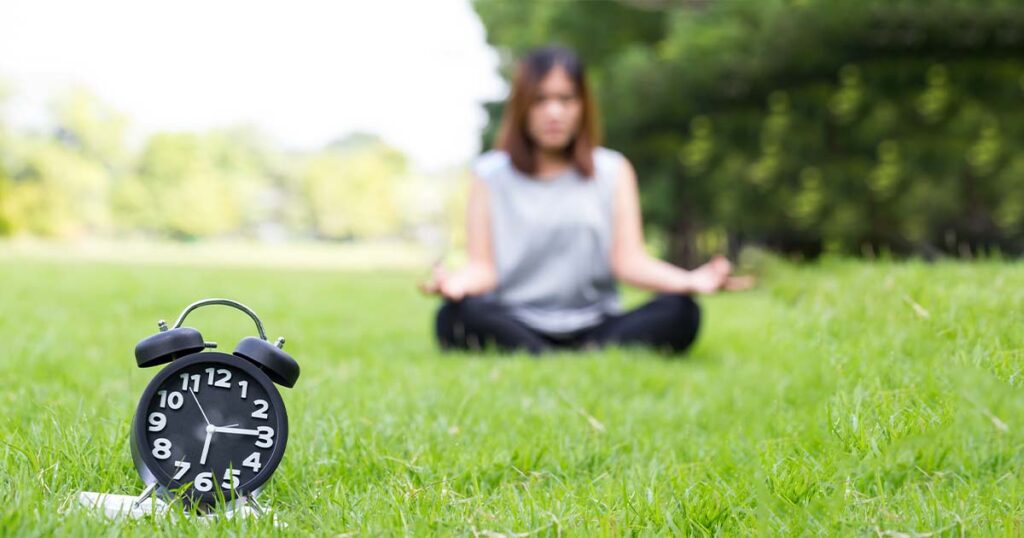When it comes to meditation, the most important thing is to do it rather than how and when you meditate. However, specific meditations are designed for certain times of the day.
Meditation is a practice that invites stillness, self-awareness, and peace into our daily lives. But when is the best time to meditate? Whether you’re just getting started with meditation for beginners or refining your existing practice, finding the right time for meditation can significantly enhance its impact. In this blog, we’ll explore different meditation techniques, the benefits of meditation, and how to incorporate them into your daily routine.
Why Timing Matters in Meditation
The best time to meditate varies from person to person, depending on your schedule, lifestyle, and energy levels. For some, meditation early in the morning sets a calm and mindful tone for the day ahead, while for others, meditating in the evening helps unwind and let go of the day’s stress.
Finding a consistent time to meditate is critical. A set routine helps your mind and body adjust to the practice, enhancing its benefits.
Morning Meditation: Starting the Day with Clarity
Morning meditation is highly recommended, especially if you want a fresh start. Early hours tend to be quieter, with fewer distractions, making focusing and engaging in meditation exercises such as this Morning Meditation for Productivity easier.
Raj, a busy entrepreneur, begins his day at 6 am with a 15-minute meditation session. He finds that this morning routine keeps him grounded and sets a tone of clarity and focus throughout his hectic workday.
Morning meditation can also create a mindset of mindfulness that carries through the rest of your day. For those looking to develop discipline and self-awareness, starting your morning with meditation can enhance productivity and emotional balance.
Midday Meditation: A Break for Mindfulness
For those who experience stress or fatigue in the middle of the day, taking a short meditation break is an excellent way to reset. If you’re facing a day packed with meetings, deadlines, or personal responsibilities, meditation offers a chance to regroup and refocus. Just 5 to 10 minutes of mindfulness can help improve concentration and reduce stress.
Next time you feel overwhelmed with your day, try this quick 5 Minute Meditation to Release Meditation.
Evening Meditation: Letting Go of the Day
Meditating in the evening can help you unwind from the day and prepare your mind for a restful sleep. It’s a moment to release any stress or unresolved emotions you may have accumulated. By incorporating meditation for beginners, even a short evening meditation can signal to your body that it’s time to relax and slow down.
Many people struggle to fall asleep, and sleep meditations are another way to practice mindfulness at a particular time of day. If you’re attempting to wind down but need some help, try this Quantum Sleep Meditation for Deep Rest in bed and see if it helps you relax.

Meditation Techniques: Tailoring the Practice to Your Needs
No matter the time of day, the meditation techniques you use can significantly improve your experience. Some popular techniques are as follows.
1. Mindfulness Meditation
We focus on the breath or a specific sensation that brings awareness to the present moment.
2. Loving-Kindness Meditation
Cultivating compassion and kindness towards oneself and others.
3. Body Scan Meditation
Mentally scanning the body to release tension and promote relaxation.
Experimenting with different meditation exercises allows you to find what works best for you at other times of the day.
How to Meditate: A Simple Guide
If you’re new to the practice and wondering how to meditate, try this simple process.
1. Find a quiet space
Ensure you’re in a calm, comfortable environment where you won’t be interrupted.
2. Choose a position
Sit comfortably on the floor or a chair with your back straight.
3. Focus on your breath
Close your eyes and bring your attention to your breathing. Notice how the air flows in and out of your body.
4. Stay present
When your mind begins to wander (and it will), gently bring your focus back to your breath.
5. Start small
If you’re a beginner, start with 5-10 minutes and gradually build up as you become more comfortable.
Overcoming Common Challenges in Meditation
Many beginners need help with challenges like restlessness or a wandering mind. If you’re having trouble, try incorporating small moments of mindfulness throughout your day. The more you practice, the easier it becomes to focus. You can also try guided meditation apps, which offer structured sessions to help you stay engaged.
Making Meditation a Consistent Habit
Creating a consistent meditation practice requires patience and dedication. Start by integrating meditation into your daily routine, whether in the morning, during a break, or at night. Over time, the benefits will become more apparent as meditation helps you build emotional resilience, improve focus, and reduce stress.
The best time to meditate depends on your personal needs and schedule. Whether you prefer morning meditation to set a peaceful tone for the day, midday meditation to refresh, or evening meditation to relax, the most important thing is finding a time that works for you. By incorporating meditation exercises into your routine, you’ll begin to experience the transformative benefits of meditation, leading to a more balanced and mindful life. If you are looking for guided meditations, SoulSensei has a range of sessions per your requirements.
Sources
- Vogue India. (2023). The Best Time to Meditate.